As the one wheel movement expands across cities, forests, and coastlines, a new challenge arises—access. Despite growing popularity, many riders find themselves restricted from public trails, bike paths, or park systems due to outdated regulations or misconceptions about electric mobility. Advocating for rider access and inclusion is not just about fighting for the right to ride—it’s about shaping a future where innovation, community, and responsible recreation are welcomed and supported.
Many public trail systems were designed before electric personal vehicles existed, which means that one wheelers often fall into a gray area. Some parks prohibit motorized transport outright, without distinguishing between a noisy gas-powered vehicle and a quiet, rider-powered electric board. As a result, riders can be fined, removed, or even banned from their favorite spots. These restrictions are frustrating, but they also present an opportunity for education and collaboration. By working with local officials, park departments, and advocacy groups, riders can help rewrite these rules to better reflect modern mobility.
Inclusion is just as important as access. The one wheel community is made up of people of all ages, backgrounds, and skill levels. Everyone deserves a place to ride safely—whether it’s a kid learning balance, a commuter trying to skip traffic, or an adaptive rider using one wheeling for mobility and freedom. Advocating for inclusion means designing spaces and policies that don’t leave anyone out. It also means listening to underrepresented voices in the community and amplifying their experiences. Inclusion doesn’t happen by accident—it takes intention, effort, and open dialogue.

The best advocacy starts with action. Riders who respect the trails, educate others, and maintain a positive presence in public spaces make a powerful case for acceptance. Organizing group cleanups, safety demonstrations, or community events can build goodwill with neighbors and decision-makers alike. Sharing stories and positive media about one wheeling helps shift the narrative from “reckless” to “responsible.” Real change happens when riders become ambassadors—not just for the sport, but for the values of safety, sustainability, and shared enjoyment of outdoor spaces.
Opening the trails isn’t a one-time campaign—it’s an ongoing mission. But with a united voice and a focus on community-building, riders can create lasting pathways—not only for themselves, but for future generations of explorers. Because every person who steps on a one wheel deserves a place to roll free.

